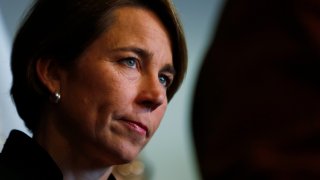
Massachusetts Democrats on Saturday afternoon endorsed Maura Healey's quest to move from the attorney general's office to the governor's suite but also put Sonia Chang-Díaz on the September primary ballot, ensuring that Healey will have some intraparty competition before she could turn her full attention to any Republican opponents.
Healey, serving her eighth year as attorney general and who has long been viewed as a gubernatorial candidate in waiting, took more than 71 percent of the votes cast by party delegates at their nominating convention at the DCU Center in Worcester. Chang-Díaz, a state senator of more than a decade, got about 29 percent of the delegate vote, almost double the 15 percent required to make it onto the Sept. 6 primary ballot.
WATCH ANYTIME FOR FREE
Stream NBC10 Boston news for free, 24/7, wherever you are. |
Healey was the favorite coming into the gathering -- a fact that Chang-Díaz used in her speech to highlight her independence from the political establishment -- and she mostly played it safe as she addressed the receptive crowd. Though she ticked off a list of things she'd do as governor -- "cutting the costs of housing, energy, and health care," creating more housing, making East-West Rail a reality, and passing same-day voter registration -- Healey did not use her remarks to dive into detail specifics.
"We are in a moment of great challenge, but also, great opportunity. We've seen loss, heartache, hardship, and problems made worse during this pandemic. But we've also seen it bring out the best in us. You see, I believe in our state and I believe in our people. I believe in our promise and our potential," Healey said. "And I believe this is our moment -- right now -- to tear down the barriers that hold people back, to come together, to lift people up, and to bring opportunity to every person in every region in this state."
Get updates on what's happening in Boston to your inbox. Sign up for our News Headlines newsletter.
After the results were announced, Healey told reporters, "I wanted to come in and do well at this convention and we did extremely well, and I'm really excited and can't wait to move forward with this campaign."
The field of candidates vying to be either Healey's or Chang-Díaz's lieutenant governor was trimmed by delegates from five to three with Sen. Adam Hinds and businessman Bret Bero falling short of the support needed to make it onto the September ballot. The LG campaigns of Salem Mayor Kim Driscoll, Rep. Tami Gouveia and Sen. Eric Lesser rallied enough delegate support to stay active and Driscoll claimed the party's endorsement.
While the party insiders at the convention and their endorsement matter (they represent just one-third of one percent of all Bay State Democrats; these are the hardcore party loyalists), there is no convention for the voters who will have the greatest say when it comes time to pick the state's next governor in November: unenrolled voters.
Local
In-depth news coverage of the Greater Boston Area.
As of Feb. 2021, there were 4,731,940 registered voters in Massachusetts -- 31.6 percent were registered as Democrats and 9.7 percent were registered as Republicans, but 57.4 percent of Massachusetts voters were unenrolled in any party, according to the secretary of state's office.
And "winning" the convention has never been a reliable predictor of success in the September primary or November general election. Steve Grossman took the party's convention endorsement in 2014 but then lost the primary election to Martha Coakley, for example.
Governor
Healey, 51, of Boston's South End, has served since 2015 as the state's attorney general. In her first run for elected office in 2014, Healey seemingly came out of nowhere to capture more than 62 percent of Democratic primary votes over former state Sen. Warren Tolman of Watertown, whose candidacy was backed by Gov. Deval Patrick and Boston Mayor Martin Walsh.
Her win made Healey the country's first openly gay state attorney general and she would make state history, if elected, as the first woman to be elected governor and the first openly gay governor of Massachusetts.
Chang-Díaz, 44, of Jamaica Plain, has served in the Massachusetts Senate since 2009 and would also make history if she's chosen by voters in November. Chang-Díaz would be the state's first elected female governor and the state's first Latina and Asian American governor.
She also holds the distinction of being the first Latina elected to the Massachusetts Senate. Chang-Díaz came up short in a 2006 primary challenge of Sen. Dianne Wilkerson and eked out a narrow victory in a 2008 rematch. Wilkerson launched a sticker campaign to keep her seat, but was arrested on federal bribery charges days before the election and was trounced by Chang-Díaz.
A steady voice for progressive causes and someone who has not shied away from prickly or sensitive debates on Beacon Hill, Chang-Díaz launched her gubernatorial bid nearly a year ago citing her legislative accomplishments around education funding and criminal justice reform, but also knocking Beacon Hill "insiders" who she said are "more interested in keeping power than in doing something with it." She stuck with that theme Saturday and delivered a rousing speech that was nearly cut off by party officials as it approached the time limit.
In her speech, the senator called attention to her having been stripped of her chairmanship of the Education Committee and seat on the Ways and Means Committee after talks around an education reform bill fell apart. Chang-Díaz framed it as a positive and as evidence that she would stand up to entrenched power if elected governor.
"It cost me favor with Beacon Hill leadership and, frankly, better pay … I lost the trappings of power. But kids here in Worcester today have the support staff and school counselors that they never would have had otherwise," she said. "That's a trade I would make every time. And friends, that's what courage gets you."
Facing an uphill battle as the underdog in the primary, Chang-Díaz told delegates that she is the candidate, not the front-runner Healey, whose positions most closely align with the platform that the party's delegates voted to approve. She said she is the only candidate in the race who supports Medicare for All, fare-free public transportation and debt-free public college and pitched herself as the candidate who would rally the full power of the Democrats' one-party rule.
"I am here to tell you that we can get there -- but we have to be clear-eyed. The reason we haven't achieved these things yet isn't due to a lack of resources, or public opinion, or even Republicans in our state. We have a Democratic supermajority in both chambers of the legislature," Chang-Díaz said. "It's because too few of our political leaders display the same acts of courage that working people do every day."
As attorney general, Healey focused a lot of her fire on President Donald Trump and major corporations like Exxon Mobil and Purdue Pharma. Her office has also been deeply involved in the details as Massachusetts shifts towards new sources of energy and attempts to meet climate commitments. With her run for governor, which she made official only after Gov. Charlie Baker announced his intent not to run, Healey is attempting to show voters that she has the skills and vision for a broader role overseeing all of state government.
Her speech to the delegates focused mostly on her record as attorney general and contrasts between herself and the Republican candidates for governor here.
"They'd take us backwards on racial justice, immigration, gun violence, on reproductive rights and climate change. The choice in this election could not be more clear; a choice between progress or partisanship, between delivering for people or dividing them," Healey said. "Our campaign is about coming together to fight for the things that matter, that actually matter to people and families all across Massachusetts."
Lieutenant Governor
Salem Mayor Kim Driscoll, who has been running the North Shore city since 2006, topped the LG field with support from 41.4 percent of the delegates at the convention. She got into the lieutenant governor's race in January promising a "new focus from Beacon Hill" on the needs of cities of towns. Driscoll previously worked as chief legal counsel and deputy city manager in Chelsea and served on the Salem City Council.
"I'm proud to be part of the get-stuff-done wing of government with a record of delivering results every day for people counting on us to do better. Those of you who serve or volunteer in a local office -- whether it's your school board, town meeting, a committee or any other form of service -- you know what I'm talking about. There's no hiding in local government. We're there front and center, fully accountable, doing the hard work to make our communities better," Driscoll said. "The stakes are higher being a leader in your community. It makes you listen. It makes you more accountable. And it makes you a better leader."
Rep. Tami Gouveia of Acton was a distant (but safe) second in the lieutenant governor's field, taking 23 percent of the delegate votes cast. Gouveia was one just two House Democrats not to support Ron Mariano for speaker last January and has openly called for more transparency in the House and within the joint committees. She was a public health project manager and executive director of Tobacco Free Massachusetts before leaping into elected politics in 2018.
"Many are locked out of opportunities, denied access to basic resources, and suffer the indignities and violence of racism and poverty. We have failed to solve the major issues that erode our faith in each other -- income inequality, environmental degradation, corporate greed, and violence and racial injustice," Gouveia said. She added, "This moment calls for a new type of lieutenant governor, a lieutenant governor who has the lived experience, the expertise, the courage and the track record to break through the same old politics to enact the bold plans you need for the quality of life we all want and all deserve. I am that lieutenant governor."
Right behind Gouveia in Saturday's balloting was Eric Lesser, a fourth-term state senator from Longmeadow and chairman of the Economic Development Committee. He had the support of about 21 percent of delegates. He dove into the race by telling voters that he "is ready to confront the reality that Massachusetts, despite its progressive history, has become one of the most unequal places in the country."
Lesser said Saturday that he is not running to point out or complain about the state's problems.
"Quite frankly, there's plenty of people that do that already. I'm running to solve them," he said.
Lesser's speech largely centered around his support and advocacy for East-West Rail, and what that long-discussed project would mean for the state's economy, job opportunities and housing costs. He also acknowledged that many people don't really know what a lieutenant governor does and said that he would use the office to make meaningful change.
"It's understandable that people ask whether their government is listening, whether it's even in our capacity anymore to meet today's challenges. But my life and my work has shown me that, yes, we can do big things. I'm running because I want to do that work, as I have all my life in the White House for President Obama and in the State House," Lesser said. "Now, I want to make sure our next governor is a success in whatever way she asks."
Sen. Adam Hinds, of Pittsfield, fell short of the 15 percent threshold with 12.4 percent of the delegate vote Saturday. Bret Bero, a Babson College business professor and former small business owner, also came up short with just 2 percent support at Saturday's convention.
Bero pitched himself Saturday as a "distinctly different candidate" who could bring different experience to the party's ticket.
"I was a small business owner in Central Mass. for over 20 years and I've worked in and understand industries critical to Massachusetts -- health care, technology, professional and financial services, manufacturing, and hospitality. As a member of the faculty of Babson College, I'm the only candidate who's been inside the classroom working with our students. And I've been part of organizations working on organizational issues and providing mental health care and addiction support services to our vulnerable citizens," he said. "In short, my decades of diverse experience enable me to bring a new and needed perspective to Beacon Hill."
Bero, who was sometimes overshadowed in the race for lieutenant governor to the point that two polls completely left him out of their surveys, made a motion during the convention to have the delegates vote by acclimation to put all candidates for statewide office on the ballot regardless of the convention outcome.
Democratic Party Chairman Gus Bickford declared the motion rejected because, he said, it ran afoul of party convention rules and because there was at least one delegate who objected to the motion, which would have had to pass with unanimous consent.
"Today, I ask for your support. If not because I'm your first choice, then because you believe in giving voters a real choice in the September primary," Bero said during his address to the delegates.
History, Sort Of
During the day Saturday, some speakers talked about making Healey and Chang-Díaz "the first female governor" of Massachusetts. Boston Mayor Michelle Wu, for example, said it is time for Massachusetts to have a woman in the corner office.
Though it has been almost two decades, there was a woman in the corner office as recently as January 2003, when Republican Gov. Jane Swift left the governor's office after filling that post when Gov. Paul Cellucci stepped down. Swift was not elected governor of Massachusetts, though, so Healey or Chang-Díaz would be the first elected female governor of Massachusetts if one of them wins in November.
But to this point, neither of the two women running for governor this year has set herself apart from others who came before. Martha Coakley, another Democrat, could have been the state's first elected female governor, but she lost to Charlie Baker in 2014.
The Democratic primary, as well as the Republican one, will be held Tuesday, Sept. 6.



